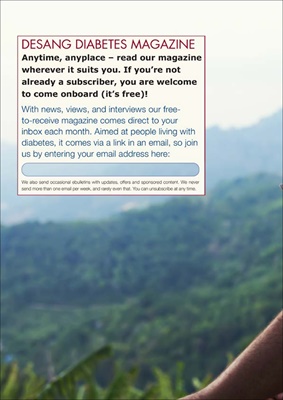
22
LIVING
Taking up the challenge
A Q&A with Professor Simon Heller talking about the
Type 1 Diabetes Grand Challenge.
Professor Simon Heller is chair of all three
scientific advisory panels in the Type 1 Diabetes
Grand Challenge. These cover beta cells, novel
insulins and root causes of Type 1 diabetes.
Along with the leading experts who sit on these panels,
Professor Heller will help to steer the direction of the
Grand Challenge to make sure our funding is invested in
the right places, with the biggest potential to change the
lives of people with Type 1 diabetes. He is also Professor
of Clinical Diabetes at the University of Sheffield and a
world-renowned scientist, whose research has led the
way in transforming our understanding of hypoglycaemia.
Why did you want to get involved with the Type 1
Diabetes Grand Challenge?
It was a huge honour to be asked to assist in determining
how this huge amount of funding could best be used to
benefit Type 1 diabetes research in the UK. It's important
to me to do my best to see our research move more
quickly towards a cure for people with Type 1.
How do you think the Type 1 Diabetes Grand Challenge
will be a game-changer for Type 1 diabetes research?
I hope that the Type 1 Diabetes Grand Challenge will
allow the UK to play a major part in moving the research
landscape closer to a cure. It will hopefully enable us
to do something much more rapidly than we otherwise
would be able to.
What would a cure for Type 1 diabetes look like to you?
A cure would be removing the burden of day-to-day
self-management of Type 1 diabetes. In particular, it
would allow people with the condition to live a life
of spontaneity and doing activities which those of us
without diabetes often take for granted.
How did you get into the field of Type 1
diabetes research?
When I arrived at the Queens Medical Centre in
Nottingham as a trainee registrar, I was intending to be
a cardiologist. But a six-month placement in a diabetes
team changed that. The legendary diabetes researcher
Robert Tattersall (who discovered MODY and introduced
the world to self-monitoring blood glucose levels) was
my boss. He was a wonderful teacher who taught me to
listen to people with diabetes and learn for myself how
much it asked of people in terms of self-management. He
also showed me that it wasn't the healthcare professionals
who made the biggest impact on managing Type 1, but
instead how much the person themselves could learn and
implement about this very complex condition. Robert
inspired me to become a researcher and showed me what
an interesting and important specialty diabetes is.
What has been your career highlight so far?
It's hard to narrow it down. One highlight is bringing the
DAFNE training course - which helps people with Type
1 lead a healthy life - from Germany to the UK's NHS.
Another key achievement was discovering that repeated
hypos lead to impaired awareness of hypoglycaemia
and increased risk of hypoglycaemia. I feel fortunate
that I have been involved in research which has made a
difference to the lives of people with Type 1.
Tell us something we don't know about diabetes or
the pancreas
When I was preparing a talk on hypoglycaemia, I learnt
that the first definition of 1 unit of insulin was the amount